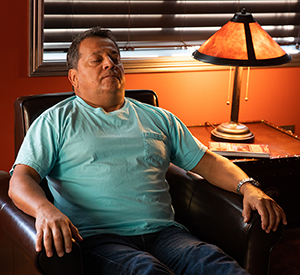Understanding Panic Disorder (Panic Attack)
A panic attack is a sudden, strong fear that lasts for several minutes when there is no real danger. With it comes terror, physical symptoms, and a strong need to escape from wherever you are. If you have these attacks often, you have panic disorder. The attacks can be very frightening. You may be scared of having another one. You may even stay away from a place where you’ve had an attack. Some people become so afraid of having panic attacks that it’s very hard for them to leave home.
Before accepting a diagnosis of panic disorder, it’s important to see your healthcare provider. Your provider will check your symptoms to make sure you don’t have another health condition that could be causing the symptoms. Conditions that can cause panic symptoms include certain heart and lung problems and thyroid disease. Other things can also cause panic attack symptoms. These include having too much caffeine or using other stimulants, such as certain medicines.
What does a panic attack feel like?
Most panic attacks start suddenly, for no clear reason. They last about 5 to 20 minutes. A panic attack can start at any time, even while you’re sleeping. During the attack, you may have:
-
A sudden surge of anxiety, as if you just missed hitting someone with your car, but with a panic attack, you’re anxious for no clear reason
-
Physical symptoms, such as sweating, shortness of breath, a pounding heart, shaking, feeling like you’re choking, chest pain, nausea, or dizziness
-
A fear that you’re having a heart attack, dying, or about to lose control
-
A feeling that things happening around you are not real
What to do during a panic attack

-
Remind yourself that your body is having a false alarm. Nothing bad will happen to you. You’ve survived attacks before, and you will this time, too.
-
Don’t fight your feelings. Let them come. Ride them out. Focus on a task like counting backward from 100. Think about a relaxing place, such as a tropical island or quiet meadow. Ask your healthcare provider or therapist for other ideas to relax.
-
If your symptoms get worse or happen more often, see your healthcare provider.
Help to get over the fear
Fear of a panic attack can make you miserable. But with professional support and self-monitoring strategies, this fear can be managed. Ask your healthcare provider or therapist for help. Remember these tips:
-
Keep in mind that places and activities don’t cause attacks. Separate the attack from the situation. Make an effort not to avoid the situation in the future.
-
Don’t give in to the urge to escape by using alcohol or medicines you weren't prescribed. In the long run, they will only add to your problems.
Warning signs for suicide
Panic disorders can be a discouraging, scary condition. It can lead some people to consider self-harm or suicide. It's very important to work with a trusted therapist, take any medicines as prescribed, and seek help right away if you have any of these symptoms:
-
Thinking often about taking your life
-
Planning how you may try to end your life
-
Talking or writing about committing suicide
-
Feeling that death is the only solution to your problems
-
Feeling a strong need to make out your will or plan your funeral
-
Giving away things you own
-
Participating in risky behaviors, such as sex with someone you don't know or drinking and driving
If you notice any of these warning signs, get help right away. You can call a mental health clinic or a 24-hour suicide crisis hotline. If there is an immediate risk, call or text 988. You will be connected to trained crisis counselors at the National Suicide Prevention Lifeline. An online chat option is also available at www.suicidepreventionlifeline.org. Lifeline is free and available 24/7. You can also call Lifeline at 800-273-TALK (800-273-8255).
Family and friends are often the first to see the warning signs of suicide. Suicidal thoughts or actions are not a harmless bid for attention. They are a sign of extreme stress and should not be ignored. If you know someone who is talking about suicide and is able to carry it out, don't leave the person alone. Take action. Remove any means, such as guns, rope, or stockpiled pills. Get help from people or agencies specializing in crisis such as those listed below.